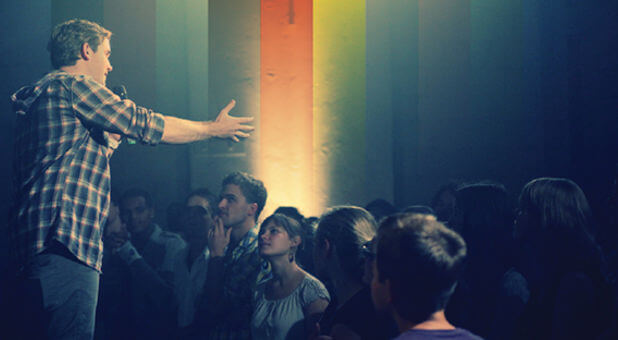Spiritual complacency rules in Germany, where most Christians seem more concerned with planning their next vacation than a move of God. But an influx of foreign Pentecostals shows early signs of reawakening the German church.
Ulf Bastian tramped into Christengemeinde Elim Pentecostal church in Hamburg, Germany, parading his punk-rocker duds: hair dyed a shocking bright color, black leather jacket, torn jeans and a T-shirt screaming the angry message, “Hate Mankind.” His ex-girlfriend, who had become a born-again Christian (and is now his wife), urged him to attend.
“I thought she was crazy,” he says. “I did not want to be part of Christian people.”
Still, the Holy Spirit coaxed him to return a second time. Arriving late, he grabbed a chair in the last row. The worship music and pastor’s preaching about sin and the cross of Christ hit home. Weeping, he rushed to the altar at the end of the service and told the pastor, “I need forgiveness.”
He learned later that people had been praying for him from the first time he stepped into Elim, especially older members of the congregation. He was embraced by the group, despite his edgy appearance, and now serves as children’s pastor. “Jesus did a great wonder in my life,” he says.
Bastian’s conversion took several years, a common trend in post-Christian Germany, where many tune out the gospel and, until recently, the spiritual fires of previous eras had been all but snuffed out.
Indeed, today’s Germans are tough customers when it comes to believing in God and accepting the exclusive claims of Christ. According to a 2008 survey released by the University of Chicago in April of this year, only 2.5 percent of East Germans and 10.9 percent of West Germans claim a belief in God.
Despite a steady decline, Christianity remains the dominant official religion, accounting for 49 million people, or about 60 percent of Germany’s population of 82 million. However, the reforming fires ignited by Martin Luther have turned stone-cold in traditional churches.
The official state-sanctioned Evangelische Kirche in Deutschland (EKD), which includes Lutheran and Reformed denominations, reigns over the Protestant scene with 24.5 million members. The Roman Catholic Church, dominant in southern Germany, claims another 25 million members.
EKD and Catholic members support their denominations and clergy through a national tithe deducted from their income tax. The Free Church (outside of the EKD), operating without financial support by the state or government, numbers about 400,000 (Baptists, Methodists, Mennonites, independent Lutherans, Pentecostals and charismatics). That category includes an estimated 100,000 Pentecostal/charismatic believers.
For a long time, Pentecostals were shunned as members of a cult. “We were labeled as not being Christian,” says Frank Schünemann, pastor of Christliches Zentrum Scala in Schorndorf.
Germany’s Pentecostal church can be traced back to 1905, when a group of Lutheran Pietists from the Fellowship Movement experienced the baptism in the Holy Spirit. The move of God, which happened in Mülheim in the Ruhr Valley, saw 3,000 conversions recorded in six weeks. Opposition surfaced after that, and Lutheran church leaders signed the Berlin Declaration in 1909, rejecting Pentecostalism as “from below.”
Growing antagonism from the EKD, Catholics and other evangelicals persisted throughout the 20th century, forcing the new Pentecostals to form the Mülheim Association in 1914, Germany’s first Pentecostal denomination. Additional independent groups sprang up in the following decades, eventually birthing the five main Pentecostal denominations operating today and representing about 900 churches: Bund Freikirchlicher Pfingstgemeinden (BFP), Church of God, Ecclesia Fellowship of Churches, Volksmission and the Mülheim Association.
Though the traditional church’s hostile attitudes toward Pentecostals existed for much of the previous century, in 1996 the German Evangelical Alliance and Pentecostal leaders signed the Kassel Declaration, integrating Pentecostals and charismatics into the Alliance. Today Pentecostal pastors network regularly with other evangelical denominations.
Christians Have Left the Building
Despite this relatively newfound partnering, Germany’s Pentecostal congregations have struggled to grow in recent years partly because most worship in nonchurch buildings that were former factories, apartment houses and offices—a turnoff to many tradition-bound Germans.
Nationwide, less than 7 percent of Germans attend Sunday services. Many remain Christian in name only, based on tradition, and espouse liberal views approving abortion, same-sex marriage and cohabitation.












